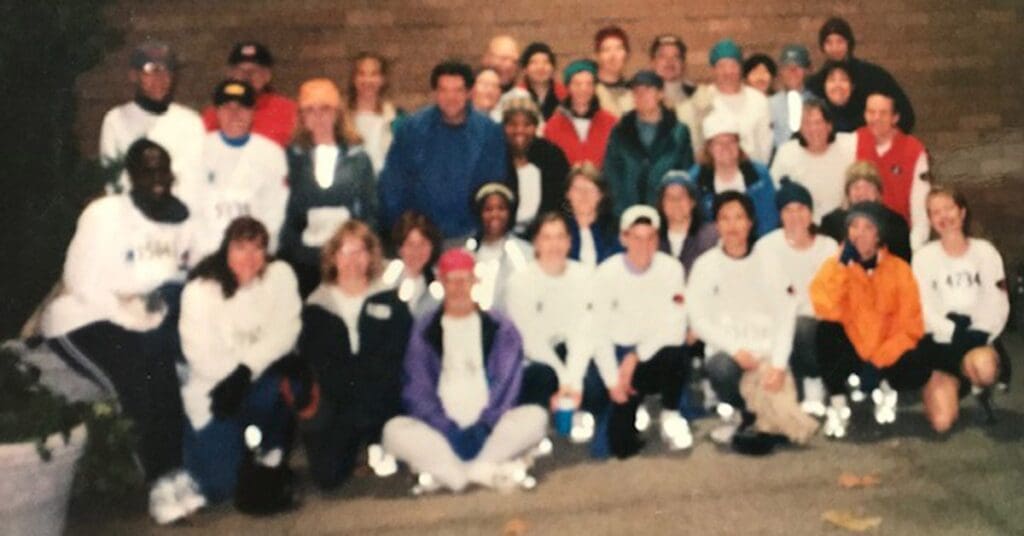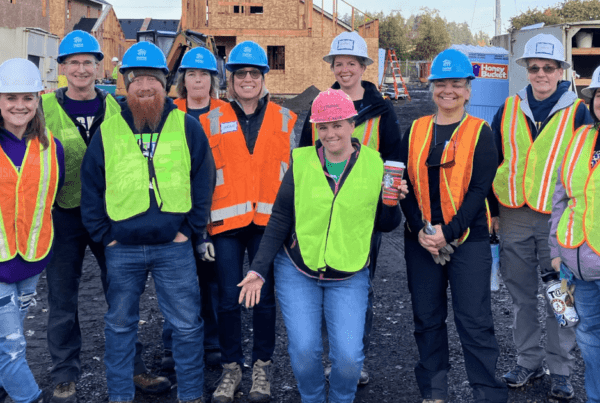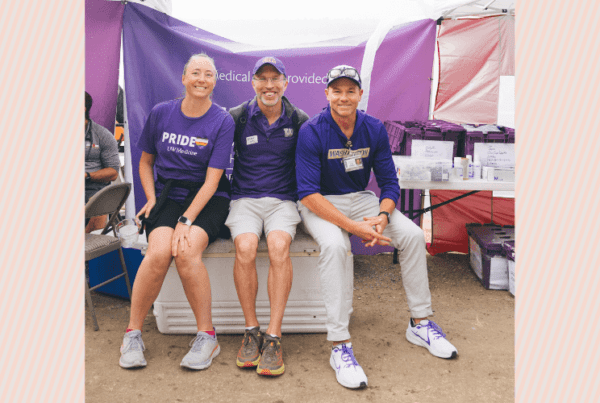Alysun Deckert, clinical nutrition manager at UW Medical Center – Montlake, started running when she was 10 years old. Her dad was a high school cross-country and track coach in Kansas, and Deckert grew up running with the high schoolers on his team.
“In the summers, his team would meet in our driveway at 6:30 a.m. and we would go on a run to get doughnuts, or we would do a watermelon run in the evening,” says Deckert.
From a young age, exercise, nutrition and fun were intertwined into her health philosophy, which she brought to her work as a dietitian at UW Medicine in 1994.
The starting line
Motivated by her work helping transplant patients with their dietary needs, she wanted to do more to encourage patients to exercise.
“Wellness and prevention start over after your transplant,” says Deckert. “And most transplant recipients feel a sense of commitment to their organ donors and they want to take care of themselves so they can enjoy their life with their new organ.”
She wanted to do something like Team in Training, a program that raises money for the Leukemia & Lymphoma Society while training for a destination race. And why not make that destination right here in Seattle.
In 2001, Deckert started Team Transplant, a group that promotes the importance of physical activity in the transplant community and fitness in the workplace by training for the Seattle Half Marathon.
“From a big-picture perspective, Team Transplant is a great way to share the message that transplants work and that recipients and living donors can live active, productive and vital lives,” says Deckert.
The team
Starting with just five transplant patients, Team Transplant now averages 50 to 60 team members each season, 20 to 25 of whom have received transplants.

The first Team Transplant, 2001.
The team isn’t limited to just recipients of transplants. Patients, their families, UW Medicine employees and even living organ donors join the race.
Everyone shows up for different reasons.
“For patients, I think it’s the feeling of community,” says Deckert. “For employees, especially if you work on an acute care floor, you sometimes only see patients who are really having a hard time and it’s easy to lose sight of all the good — Team Transplant is a great reminder that there are patients who do really well and you never see back in the hospital again.”
The training
“My patients like to joke that I come in right after a surgery and say, ‘You are going to do a half marathon,’” says Deckert. “Although that’s not exactly how it happens, I do tell them, ‘Don’t be afraid to start where you are. Just because you can’t do something now, doesn’t mean you can’t ever do it. That’s what the training is for — to get you where you want to go.’”
Every year Team Transplant has two 16-week training seasons that each culminate with a half marathon. Participants are given a training schedule at the beginning of the season with workout milage recommendations based on their current level of fitness.
The team, led by Deckert, meets at a different location every Saturday morning, running anywhere from Alki Beach to Kirkland.
Working toward the half marathon provides a goal to keep participants on track and motivated while being centered on fun, community-based training.
As a former competitive runner, qualifying for the Olympic trials multiple times, Deckert knows the ups and downs of training: what it’s like to push yourself to get the time you want and how to come back from injuries. It’s what makes her a great coach.
This year, with COVID-19, Saturday morning training meetups are now warmups via Zoom.
Deckert says it’s more social than anything, but it keeps people motivated and engaged.
The race
At the end of the 16-week training program, the participants run and walk the Seattle Half Marathon; some even do the full.
The 2020 virtual Seattle Marathon and Half took place on Nov. 29. Participants planned and ran their own route and recorded their times via an app.
Although the virtual marathon didn’t have the same sense of comradery and all the cheering Seattleites, Deckert says it’s more about the journey and realizing what your body can do.
“It isn’t about doing the half marathon, it’s about making exercise a part of your life and your routine,” says Deckert.
The 20 (year) mile-marker
Over the past 20 years, Deckert has seen amazing outcomes and inspiring stories.
“A liver transplant participant with a significant history of depression told me running with Team Transplant totally changed his life, and there was the heart transplant recipient running for their donor who had died while training for the Seattle Marathon,” says Deckert. “Another patient with low blood pressure stopped every few miles to check in with the medics for clearance to continue — and he completed the full marathon.”
There are more stories like this than she can count, and that’s why this year is meaningful — 20 years of positive outcomes and friendships.
“We have built a close community,” says Deckert. “Over the past 20 years, I have had the privilege of getting to know a lot of people and develop a broader understanding of what the patients we work with are going through and what they can do.”
Deckert says exercise and diet are not “cure-alls,” but add in the sense of community and a bit of fun, which help you have the foundation and support you need to get through whatever treatment or transition you are going through.
Want to join Team Transplant?
- Learn more about Team Transplant.
- If you are interested in joining Team Transplant, email: teamtx@uw.edu.
- Follow on Facebook to keep up with events and look out for a special 20 years of Team Transplant virtual celebration.
- Make a gift to the Team Transplant Fund or support Team Transplant by purchasing apparel (a portion of the cost will go directly to supporting Team Transplant members and activities).


